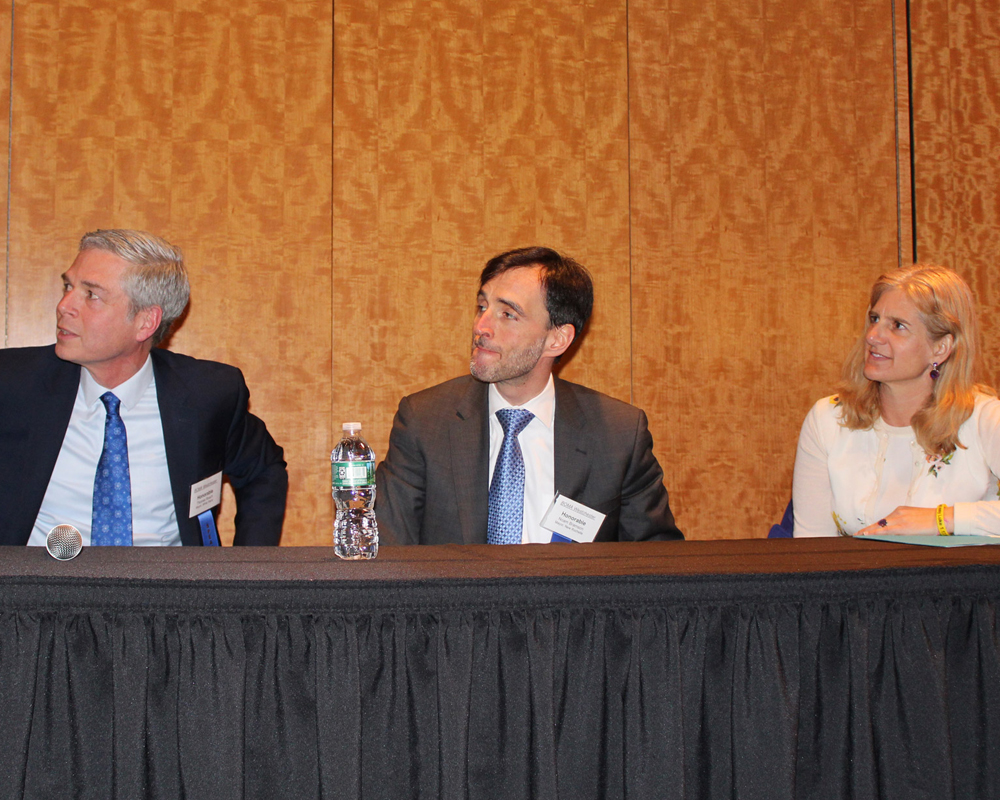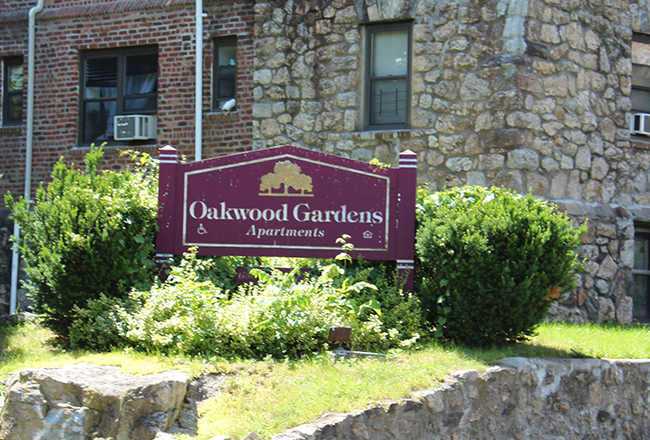”I thought I was gonna have a heart attack. It really came out of nowhere,” New Rochelle Mayor Noam Bramson said about the phone call he got from an official of Con Ed informing him that the utility was imposing a moratorium on new natural gas hookups.
Bramson, along with White Plains Mayor Tom Roach and Wilson Kimball, director of Planning and Development for the city of Yonkers, appeared at the April 11 monthly luncheon meeting of the Building Owners & Management Association of Westchester County Inc. The event took place at 360 Hamilton Ave. in White Plains.

Kevin Plunkett, director of strategic initiatives for Simone Development Cos., served as moderator of the panel discussion and began by pointing out that the elephant in the room was the Con Ed natural gas moratorium.
The utility said that it could no longer ensure an adequate supply of gas at peak times for future customers and, as of March 15, was no longer be accepting applications for new natural gas connections in most of its Westchester service area. New applications for interruptible service and natural-gas-fueled emergency generators continue to be accepted. Interruptible service involves installing equipment that can be switched to burn another fuel, such as oil, as a gas replacement.
“My first feeling was, ”˜My goodness, we”™ve worked so hard over a period of years to finally put ourselves in a position where we could attract meaningful investment to our downtown with all the benefits that flow from that. Is this one thing that (will) sink the ship and sort of put a hard stop on everything that we”™ve accomplished, everything that we”™ve anticipated”™” Bramson said.
It”™s not that Bramson is a fan of burning fossil fuels. “The concern was really more the abrupt nature of the transition and the fact that it came without warning on this sort of very limited window of opportunity to reposition developments that it might be just a practical impossibility for developers to accommodate themselves to the shift.”
In the short time since the moratorium has been in effect, rather than pulling the plug, developers whose projects already have momentum seem to be adapting to what Con Ed has done.
As the Business Journal reported, Huguenot Partners LLC has decided to spend an additional $1 million to install dual-fuel equipment in its project to be built at 327-339 Huguenot St. in New Rochelle.
“At least for now, there is not a single project that has pulled out of New Rochelle as a consequence of the gas moratorium,” Bramson said. “We”™re not out of the woods yet. There are plenty of projects that still have to get into the ground, that are still looking for financing.” Bramson said this now appears to be a surmountable obstacle, rather than an absolute block.
Kimball said they don”™t yet know what the impact is in Yonkers.
“We were incensed not only by the immediate abrupt nature of it, but also the geographic limitations. ”¦Bedford is fine but Yonkers doesn”™t get gas. Like really?” She expressed concern that the Chicken Island development in the heart of the city could be at risk. In the deal, the city would sell the 6-acre Chicken Island parking lot to AMS Acquisition for $16 million so that a mixed-use project, which would include a luxury hotel, could be built.
“The only thing we know for sure is that Chicken Island is at risk. We don”™t know how much of a risk it is; we”™ll have a better sense as that sort of unfolds, but that”™s a big deal for the city. There”™s probably no municipality in America that wouldn”™t like to get $16 million with no strings attached,” she said.
Roach saw the moratorium as an opportunity to accelerate the movement toward renewables.
“That”™s where we”™re all going to be in less than a decade. It”™s going to be moving that way anyway,” he said.
Roach disclosed that right now in White Plains they”™re working to see whether they can put together a map which will tell developers where the good sites are likely to be for installing geothermal heat pumps. He challenged the notion that the instant answer is to build a new natural gas pipeline to feed Con Ed.
“Have you any idea how long it would take to get the pipeline approved? A pipeline going through the New York region into Westchester, it”™s not gonna happen” he said. “We”™ve got to play the hand we have in front of us and I think we”™re in good shape to do it.”
The panelists did not see an extraordinary amount of opportunity in the federal government”™s Opportunity Zone effort as established in the tax code by the Tax Cuts and Jobs Act on December 22, 2017.
The zones are established in economically distressed communities and investors putting money into projects in the zones may, under certain conditions, be eligible for tax benefits. Wilson said it might help in Yonkers in a limited way. Bramson said it has made a couple of sites in the western portion of New Rochelle”™s downtown more attractive than they would have been otherwise. Roach said he thought hedge funds stood to benefit most.
All three agreed that the efforts by their cities to promote affordable housing would continue. Roach said that he would like to see the basic requirement in White Plains raised to 12% affordable units in new residential developments.
Roach noted that the office vacancy rate in White Plains is the lowest it has been in decades and, “The number of people that want to live in White Plains and Yonkers and New Rochelle is growing dramatically as people are recognizing the value of being to be able to walk to whatever they”™re doing, to have that mass transit access into New York City. I feel like all three of us have already done a lot and there”™s more coming.”




















